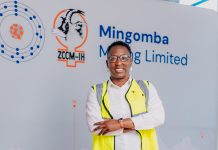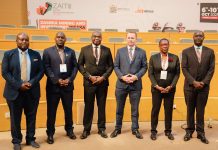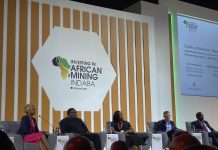Anthony Mukutuma currently runs First Quantum Minerals’ Guelb Moghrein copper-gold mine in Mauritania. In this interview, he talks about his career path, life in Mauritania and what it’s like to be a Zambian in a foreign country.
1. From Zambia to Mauritania – how did the journey unfold?
Not in a straight line! There was lots of studying, lots of hard work, lots of travel, and years and years of experience.
2. How much studying?
First there was a degree from the University of Birmingham in Chemical Engineering, with Minerals Engineering. Then much later, I got an MBA in Accounting and Finance at the University of Liverpool – with distinction.
3. And the experience?
I started out as a metallurgist in mineral processing at the Konkola Division of the then Zambia Consolidated Copper Mines (ZCCM). But my career really took off when I moved into the field of hydrometallurgy – which is the use of aqueous chemistry to remove metal from the ore. I fell in love with it immediately.
4. You worked in hydrometallurgy at Anglo American’s research laboratories in South Africa?
Yes. Anglo were the new private owners of Konkola Copper Mine. Opportunities for growth had been limited under ZCCM. It was different with Anglo: within six months, I was doing varied, interesting high-level work and international travel.
5. Hydrometallurgy seemed to open doors for you.
Yes. It got me into First Quantum Minerals (FQM), where I did some exciting work at their Bwana Mkubwa Mine processing plant in Ndola. I went from Senior Metallurgist to Plant Manager, and finally to Technical Manager.
6. A role that took you to other countries?
Yes. I was looking after FQM projects not just at Kansanshi Mine in Solwezi, but also Guelb Moghrein in Mauritania and the early stages of the Kevitsa Mine project in Finland.
7. You then went back to Finland.
Yes. As Plant Manager at the Kevitsa Mine. I was there for four years and enjoyed every minute of it. It was a very different culture. The mine is in the Arctic circle, way up in the north. I was then asked to take on the position of General Manager at the Guelb Moghrein mine in Mauritania.

8. How have you found adapting to life in Mauritania?
When I flew out of Finland in the morning, it was -32°C; when I landed in Mauritania in the afternoon, it was 40°C – and it was winter! This is not an easy place to work in. It’s in the desert, so temperatures can easily reach 50°C by mid-afternoon during the summer.
On a professional level, the transition from engineer to business leader wasn’t an easy one to navigate, and I had to make a few adjustments. My MBA helped, as did the leadership training and coaching arranged by FQM.
9. What language do you speak on the mine?
The languages spoken here are French and Arabic. However, most of the senior management team speak good English. Occasionally, I’ll need a translator, particularly in meetings with government officials and local organisations. I think I’d enjoy things more if I could just walk onto the site and talk to anyone and everyone without worrying about language barriers!
10. How do Zambia and Mauritania compare on a technical/professional level?
Zambia has a long history of mining. A history that has included a highly funded education programme for people from all family backgrounds. Not just university, but technical colleges and apprenticeship programmes too. From my time at high school doing A-levels, all the way through to my ZCCM scholarship years, I have connected with more than 200 other students at various stages of study. Although a number of these are no longer in the mining industry, the overall result is that the general standard of skills on the Zambian mines is higher.
11. How have you developed professionally in Mauritania?
Looking after a mine at the highest level, in a remote location and in a foreign country, has helped me develop professionally. I have to make business decisions daily, and their impact is far-reaching. I constantly negotiate, arbitrate, reposition and direct. My professional development has definitely been fast-tracked as a result of working in Mauritania.
12. Do you consider yourself as an expat?
Yes, in the sense that my time here is fixed. I therefore have to work on developing and supporting the local employees.
13. Are there other Zambians working at the mine?
There are two other Zambians working here. One is very senior – an Engineering Manager. The other is a specialist crushing-plant maintenance-fitter from Kansanshi.
14. What is the make-up of the workforce?
Out of 1000 employees, there are about 50 expats. From countries such as Peru, Canada, Britain, Dominican Republic, the Democratic Republic of Congo, the Americas, South Africa, Australia, Finland – and, of course, Zambia.
The mine is located in the desert, where summer temperatures can soar to 50°C.
15. How do people react when they learn that you’re from Zambia?
Initially the nationality stands out. Eventually, personality and leadership style shape people’s reactions. When all is said and done, nationality counts for nothing. What counts is what you do, how you do it, and how you interact with others and with the local community.
16. Do you see yourself as contributing to Mauritania’s skills base in mining?
Yes. I spend quite a lot of my day coaching and mentoring the senior Mauritanians on the management team, as well as young Mauritanian engineers with potential. I am a big believer in always searching for potential. If I find even a glimmer of it, I do all I can to develop it.
17. What specific skill-set do you bring to your job that is not available in Mauritania?
I have experience over many years on various projects, in different cultures. I therefore bring both technical expertise and leadership, which I am able to apply in a local context.
18. How do you see the mining skills situation in Mauritania?
The country is strong in heavy-equipment operators, coming from a long history of high volumes at the large iron ore mine in the north. The weakness is mainly around the number of engineers with many years of specific experience in mining and mineral processing. The other reason is the population of Mauritania is very low – under four million.
19. Is there a skills-transfer/mentoring requirement in your job?
Yes. It isn’t a requirement for the specific job that I do, but it is something that I personally find satisfying as an individual.
20. What is the position of the Mauritanian government on the use of expatriates in the mining industry?
The government’s stance on localisation is strong; like in most countries. I saw the same stance in Finland. The view is expatriates should be the last port of call; only after it is clear that the required skills are not available in-country. There is also an expectation that expatriates should transfer skills and knowledge to local employees. This is all done through a formal, documented localisation plan. This has worked well at Guelb Mohgrein, and the feedback from government has been extremely positive.
21. Has your experience in Mauritania altered your view of the skills situation in Zambia?
In a way, yes. It has reinforced my conviction that Zambia has a very good pool of mining skills.
22. What are the professional benefits of working for a multinational company like FQM?
You get to work with people from different cultures – and believe me, there is a lot of benefit in diversity! Also, working for a multinational, one gets to travel the world for work. I’ve been to some exotic places. When I spent time at the FQM offices in London, Perth, Finland, Mauritania or other places, it was always good to bump into other Zambians.
23. Do you hope to go back to Zambia one day?
When the time is right – yes. I’ve gained a lot of skills and experience that are in short supply back home. Also, I feel I’m done travelling the world!
SEE ALSO: Zambia’s foreign legion?
























